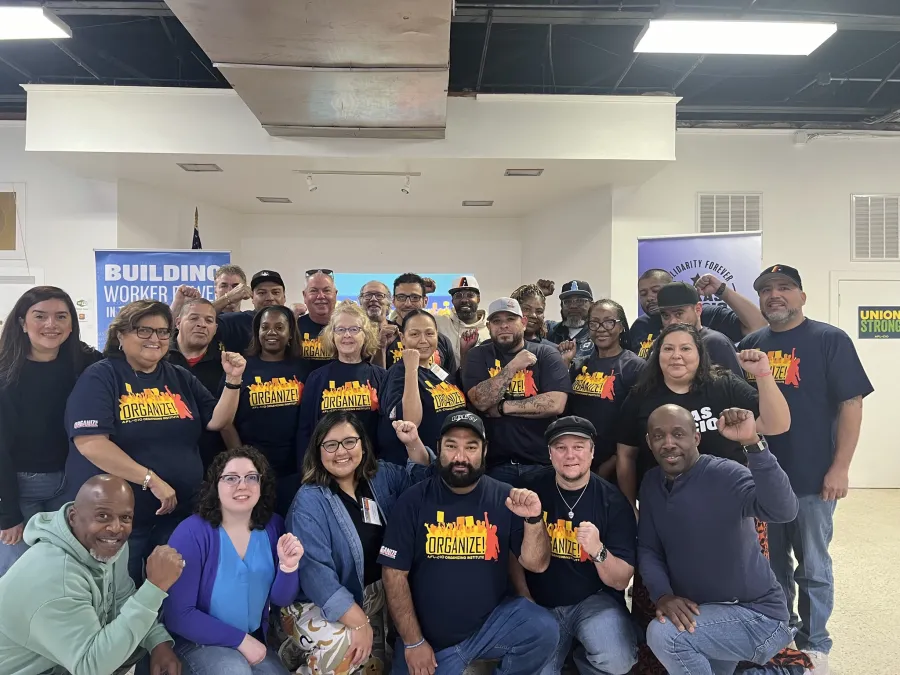Texas-Led AFL-CIO Organizing Institute 3-Day Training Rocks, Couldn’t Have Been Better Timed

Union organizing is the toughest — but most rewarding — job in the labor movement.
Over a long weekend, workers from across the state attended the AFL-CIO Organizing Institute’s 3-Day Training, a time-tested crucible for union members who want to elevate their skills. The program demands active participation and reveals talent, potential, and areas needing improvement.
One of the trainers offered the best summary of the training goal we've heard: “The Understanding of How to Listen.”
The couple of dozen trainees came from unions representing communications workers, seafarers, theatrical stage workers, electrical workers, longshoremen, maritime workers, plumbers, painters, transport workers, and the many faces of Workers United.
In the introductions, participants discussed a unique or unusual experience they brought to the table. A few examples: mother of a world champion cheerleader, a drummer, an organizer who once obtained a 700-0 union vote, a sound engineer who worked with Stevie Wonder, B.B. King and other luminaries, a ferret-owner, a yoga teacher (we got a sample relaxation technique), a sea survival expert, and a collector of Houston Astros caps.
The expert lineup of trainers put in long hours to be certified. This training made history as the first OI event coordinated by Texans, in the persons of Texas AFL-CIO Training and Leadership Development Coordinator Lorraine Montemayor and Linda Morales, Organizing Coordinator at the Gulf Coast Area Labor Federation. Texas AFL-CIO Director of Organizing and Advocacy Ana Gonzalez taught and assisted as well. The event was held in the Ceole Speight House of Labor, headquarters for ALF, in Houston.
In addition to organizing the event down to the minute, Sisters Montemayor and Morales taught segments of the training and kept trainees apprised of all logistics. They led phenomenally well.
The consequence of this breakthrough will run wide and deep. At a time when unions are organizing at historic rates, Texas will have an opportunity to run OI trainings under the auspices of the national program.
Other trainers included long-time AFL-CIO Organizing Institute Director Patrick Scott, Charles Lundy and Daisy Monterroso of the AFL-CIO, Belinda Aguilar of the Communications Workers of America, Steven Stokes of the Texas State Employees Union, Christopher Reeves of the International Brotherhood of Electrical Workers, and Bronte Yardley of the Central Oklahoma Labor Federation.
Scott observed and evaluated far more than he participated, but he offered at least two critical pep talks. As part of the training, he spoke of organizing work as “the conversation of a lifetime,” a one-on-one effort to show workers how labor unions are usually “the only way to change a company” and the magic of seeing a worker conclude that unions can change one’s life for the better. And on Saturday morning, after the landslide United Auto Workers win at the Volkswagen plant in Chattanooga, in impromptu remarks, Scott connected the dots between the 3-day training and the favorable winds in our movement.
The training is one part traditional classroom instruction and three parts small-group role playing in which participants work on real-life situations that an organizer faces. In the role play, for example, a trainer may put up every piece of resistance known to man and woman to force a trainee to be creative about getting a conversation started and getting in the door of a home (or at least to a private space).
Topics covered included: fundamental principles of organizing (hint: each worker has a story; listen carefully, ask the right questions, build rapport); phases of an organizing campaign; the one-on-one agenda (a major piece in the practice sessions); explaining the vision of the union; building leadership committees; inoculating against anti-union campaigns; assess union support and agitate to action; house call exercises; issue campaigns; and charting campaigns. The topics are introductory, but the amount of nuance, based on questions and examples from the breakout sessions, is incredible.
We never knew the use of charts could be such a defining experience for an organizer. Trainer Steven Stokes said the visual flow of who is where and when makes or breaks campaigns. If you lose your chart, “It’s like losing your campaign," Stokes said. "It’s like losing your life…Once you start using a chart, you’ll never let it go.”
In the segment on leadership of unions, participants were handed fictional biographies of employees. Each one had pluses and minuses, and it was up to small groups to decide which ones mattered the most in building an organizing campaign. That choice isn’t easy, and there was no one right answer, but the intuition of the participants on how to choose was usually spot-on, with different groups independently reaching the same conclusions much of the time.
Takeaway: Every exercise leads to discussion of strong fundamentals.
The OI training in Houston marks another proactive addition to the state labor federation’s mission of advocating for working people across Texas. There was a time when Texas organizers most likely needed to leave the state to do this training. Now, the schedule is in our hands.
Congratulations to the graduates who earned their completion certificates. What they learned has real potential to change the world.
